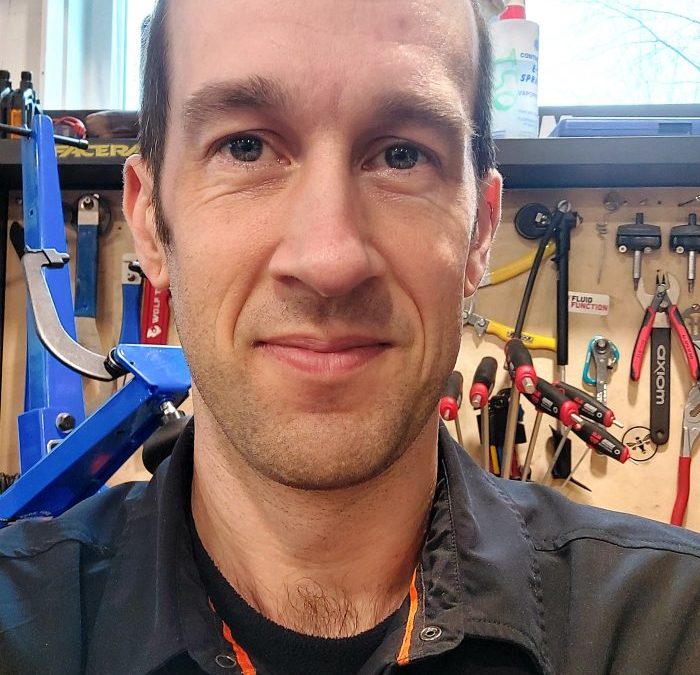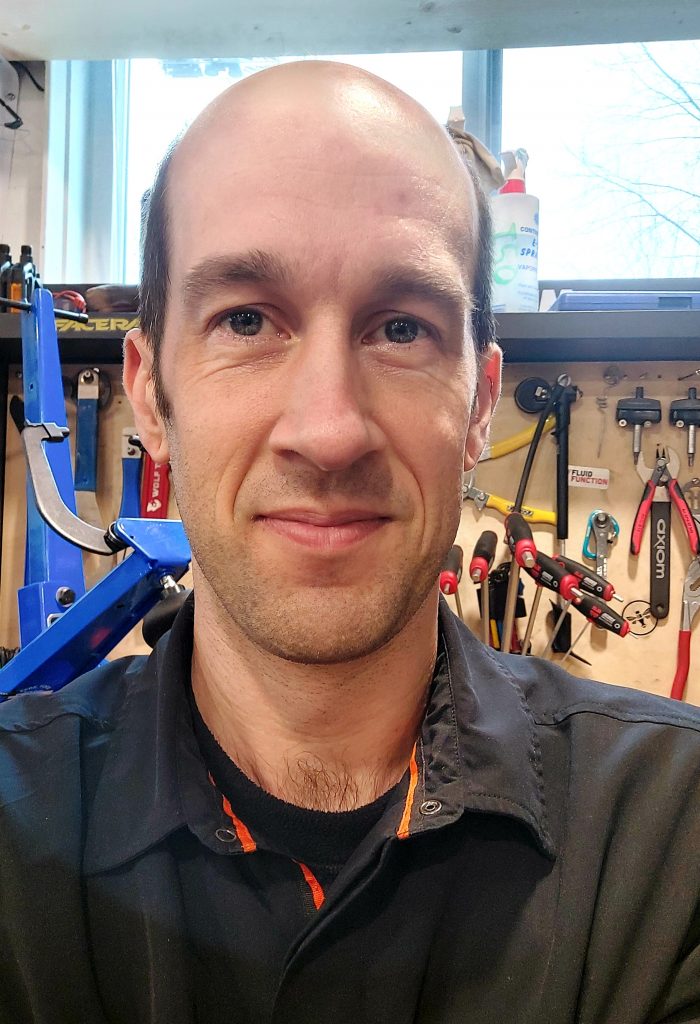
Geoff MacDonald
Geoff MacDonald is a bicycle mechanic with more than two decades of experience ranging from community bike-kitchens to UCI neutral race support. He is currently the head-mechanic and instructor at Essential Cycles in North Vancouver, BC. Geoff is a singer and multi-instrumentalist, makes his own clothes, obsesses over chess, and studies the cognitive psychology intrinsic to prestidigitation & legerdemain. He looks forward to writing the next chapter of his storied life…
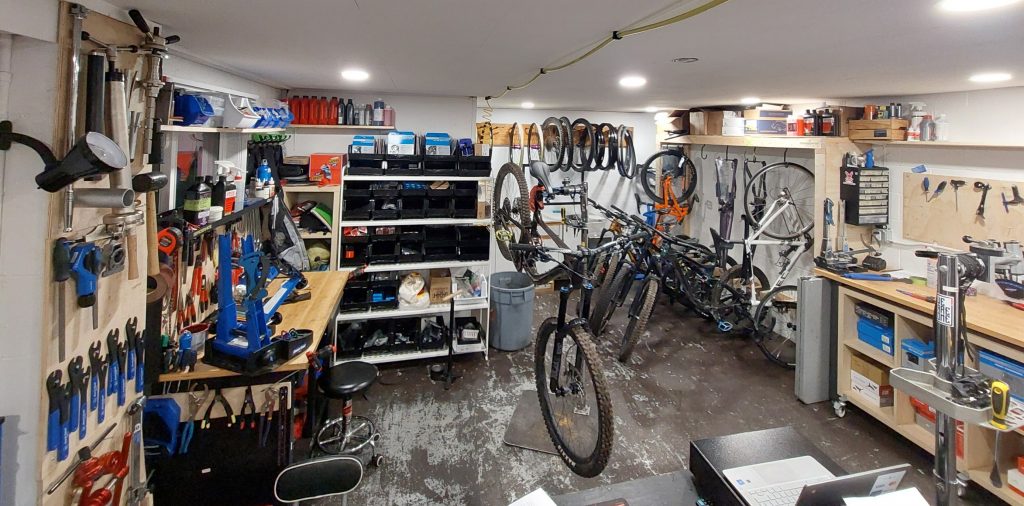
My path through life has not been a linear one. I look back at demarcated chapters of my life like reading the index of collected of stories: musician, bike courier, high-rise window cleaner, scuba diver, swing dancer, cowboy and, most recently, mature university student. However, throughout it all, one common theme has been my lifelong love affair with the literal and philosophical utilitarian beauty of the bicycle. Much more than pastime or a method of transportation, I see the bike as a source of freedom, self-empowerment, happiness and community.
I have been a bike mechanic for over two decades, and for many years have dreamed about owning my own bike shop. However, I did not felt the need to rush into making that dream a reality, choosing instead to pursue it only when I felt I had enough experience to make my shop stand out amongst the crowded market. Now, as I approach my fortieth birthday, I am nearing the end of my ‘university chapter’ and find myself extremely excited to be writing the start of the next one -that of being a bike shop owner. I am fortunate enough to have been asked to partner with Jaclyn Delacroix –owner of Essential Cycles, a local mountain bike rental shop –and have been afforded the opportunity to build up a service shop and mechanic’s training centre.
A fundamental part of what Jaclyn and I are trying to create together is a bike shop that people feel welcome. Timothy Wesolowski (4)explored the role that bike shops can play in building community for his Honors Thesis in Community Development at Portland State University. Through interviews conducted within the Portland cycling community, he found that a local bike shop (LBS) that can become a “third place” often becomes a staple of the community. The “Third Place” refers to a place outside of the home or work that people feel comfortable to spend time building social capital amongst people other than their family or coworkers. This is the sort of inclusive environment that Jaclyn and I are hoping to create.In time this should serve to build our reputation in the local market as a go-to shop, not only for great service, but as a place to feel at home.
Beyond impeccable repair-work, a large part of what it takes to become the go-to shop boils down to the connections between people, and the resultant community created. Through reading industry reports, conducting interviews with members of the community, and drawing upon my own personal history, I truly believe that being welcoming to everyone, engaging in community building and treating employees well is a strong formula for success, and that by adhering to these ideas, Essential Cycles will thrive and become a community hub.
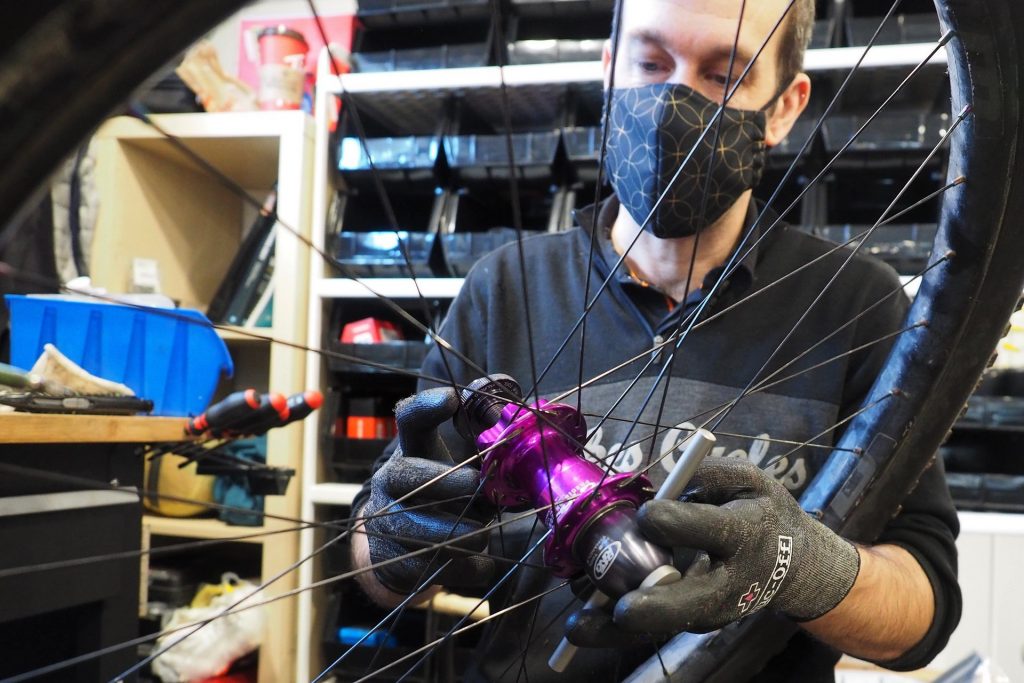
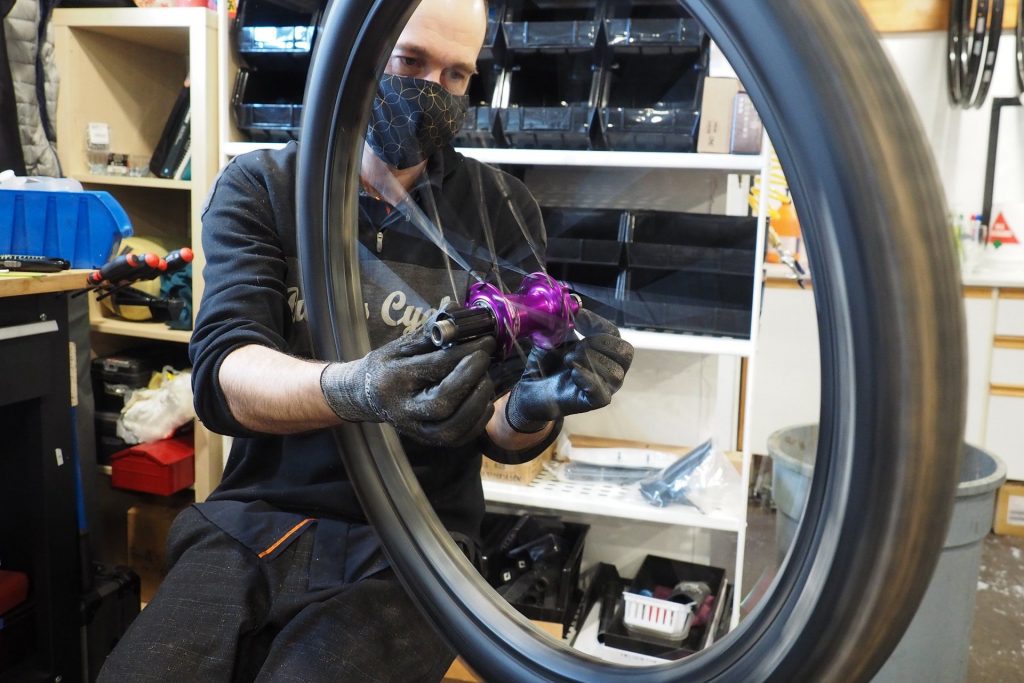
I began my journey as a mechanic by volunteering at Our Community Bikes, a not-for profit community-based shop that focuses on DIY empowerment by teaching bike mechanics to those that want to learn (“Our Story”) I immediately became hooked on mechanical repair and would head to OCB multiple times a week to lend a hand for whatever projects they had on the go, and also to hang out with friends and like-minded people. Dylan Hargrave, a former long-time employee at OCB and one of my early mentors, believes that it was this community aspect of the business that has helped it thrive and remain a pillar of the East-Van cycling community for nearly thirty years.
I volunteered at OCB for many years, keeping bike-mechanics as a hobby, but during a trip to Cuba when I was twenty-five one of the things that really struck me was how passionate everyone was about their jobs –everyone knew they would make the same living regardless of what they did, so they all chose to work in fields they enjoyed. I drew inspiration from this, and upon my return home, promptly quit my retail job, applied at every bike shop in the city looking for a mechanic, and eventually landed in a shop in downtown Vancouver. Since then I have worked in over fifteen different shops in seven cities and four different countries. I considered travelling and frequently changing shops as a paid education –I would actively search out talented mechanics to learn from, and hone my skills under their mentorship. Along the way I was also exposed to a plethora of different management types and shop vibes, and have been able to draw upon that experience as foundations for building the shop I want to run.
This experience became very important when I began discussing a partnership with Jaclyn. Our decision to become business partners was not a quick one, we worked through ideas with regular discussion for nearly two years before I jumped on board. Looking back through the notebook I kept of those discussions, the first page of notes I have is labeled “Operating Principles” and includes the bullet points: High quality, friendly service; a welcoming and engaging environment; take good care of employees; become a staple shop of the community.The desire to become part of the community is thus a foundational principle for what the two of us hope to achieve, and it likely stems from our combined experience with the bike industry. It is unfortunately well-known that some bike shops hold a better-than-thou attitude and don’t always seem welcoming to all people. The bike shop becomes a place of the initiated, with secret codes of technical jargon or a need for the right gear to be welcomed. Yet, in doing my research,I found an interesting dichotomy arose-many shop owners interviewed are aware of this negative attitude, but also posit that community engagement and inclusivity is their highest priority. How can this be?
Total Rush is a high-end road bike shop in Australia frequented by customers wearing designer suits bringing in their top-end road bikes and a “money is no object” attitude which is reciprocated by the “we only work on high-end bikes” attitude adopted by the majority of the staff. While successful at catering to one demographic of the market, the shop’s reputation amongst those who were not part of the elite crowd leaves something to be desired. Google reviews include complaints such as “The staff, including the owner, treat you like you’re not worthy to be in their shop and are just an inconvenience to them”and “Not a very welcoming/receptive location for the beginner / newcomer.”It is obvious that Simon, the owner has to devote time to responding to such criticisms-often offering refunds or store credits to customers who have had bad experiences, which is surely not a productive or profitable way to be spending his time.
On the flip side, Jaimie Hooper and Nick Hart ran Super champion, a small repair focused shop in Vancouver’s downtown East-side. Only a block off of Main & Hastings, the epicentre of one of the poorest area codes in Canada, the old business adage “location, location, location!” was seemingly ignored.Yet the two of them ran a thriving business that drew folks from all over the city. Their flawless list of five-star reviews are a testament to their friendly and welcoming service including: “People that care about what they are doing. The world needs more shops like this,” and “Came here out of curiosity; left with a impression of excellent customer service to remember!” Quite literally the only review they received less than five stars was from someone who was upset he went on a day they were closed. Jaime admits that the majority of customers coming in for the first time did so because they had read reviews that mentioned how nice the two of them were. Furthermore that a warm reception when first entering the shop and one good repair was often enough to be the create a repeat customer for life.
So,I can see that both worlds exist in conjunction. However, having worked –and shopped –at stores of both ilk, I know which I prefer. More importantly,I know which I would like my shop to be. I would much rather be the shop owner that welcomes people in the door, rather than chasing up bad reviews on the internet. The true test I see with my current opportunity, is that saying something is not the same as doing something, and thus concrete action must be taken in order to affect change.
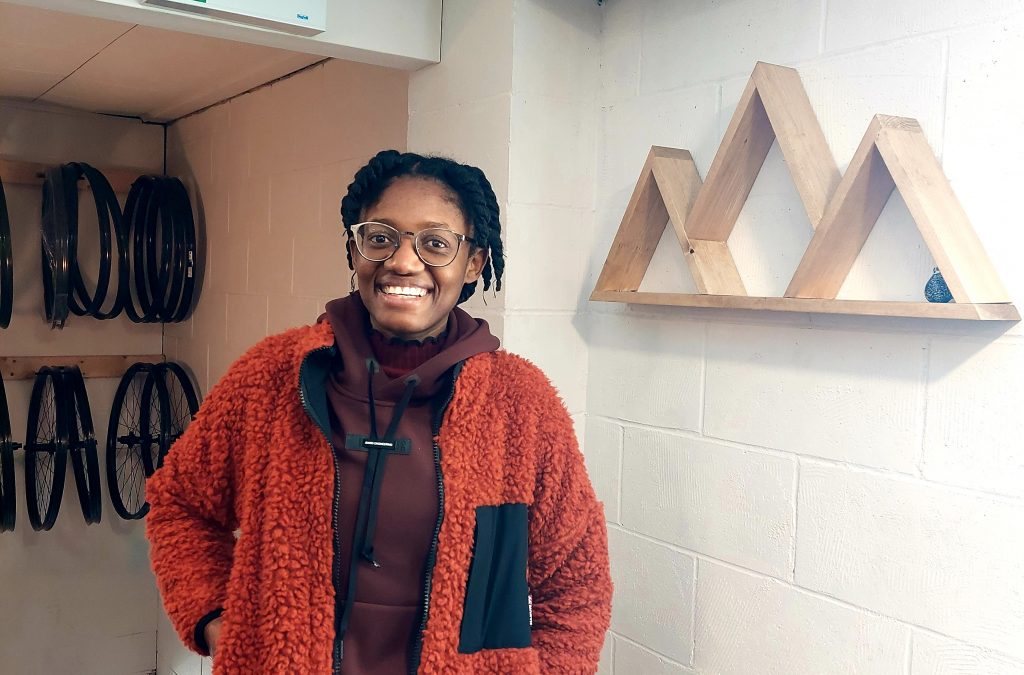
The idea that words without action are pointless was something that really stuck with me when I spoke with Judy Kasiama- founder of Colour the Trails, an advocacy group for inclusive representation in outdoor spaces aiming to break barriers and create outdoor accessibility (“Who We Are”) Judy spoke of some of her experiences of receiving lip service from large organizations claiming to want to help out, but ultimately not following through. Conversely, she also highlighted the opportunities that have been created in partnering with EssentialCycles.In the summer of 2020, before I was involved with the shop, Jaclyn reached out to Judy to see if Colour the Trails was interested in an introduction to mountain-biking collaboration. The inaugural day was a success and both parties were immediately interested in continuing to build the partnership. Jaclyn was able to use her industry connections to help forge brand partnerships that help reduce the financial barriers intrinsic to mountain-biking. We also now offer discounted rentals to members of Colour the Trails in order to increase accessibility. Together Judy and Jaclyn also developed a mentorship program that pairs new riders with more experienced people in order to create friendships while building skills and sharing knowledge.
Part of the success in the partnership that has been formed is that Judy was able to trust Jaclyn as a strong and well-respected woman in the mountain bike industry. I am cognizant that, as a white male, I am now part of the collaboration and to be respectful of the groundwork that has already been done. In my chat with Judy, she highlighted the fact that I have lots of knowledge to share when it comes to bicycle repair, which can be invaluable to people just becoming familiar with the sport. As I have been developing a training school at the shop, we discussed running maintenance seminars for the members of Colour the Trails as a way for me to give back to the community and to increase inclusivity in the world of cycling, both in the saddle, and in the workshop.
Another takeaway from my conversation with Judy was that women, more than men, often feel that the sense of community-feeling part of something bigger than themselves-is extremely important, and that riding clubs are a great way to foster this sense of community. Jaclyn is also apart-owner of the Muddbunnies Cycling Club (“History of the Muddbunnies”) a women’s focused riding club that offers a safe, inclusive and encouraging environment for those looking to get into the sport. Essential Cycles thus also has a partnership with the Muddbunnies so their members will often be looking to us for support which should lead to ample opportunity to be welcoming and engaging to another often under-represented demographic in the cycling industry.
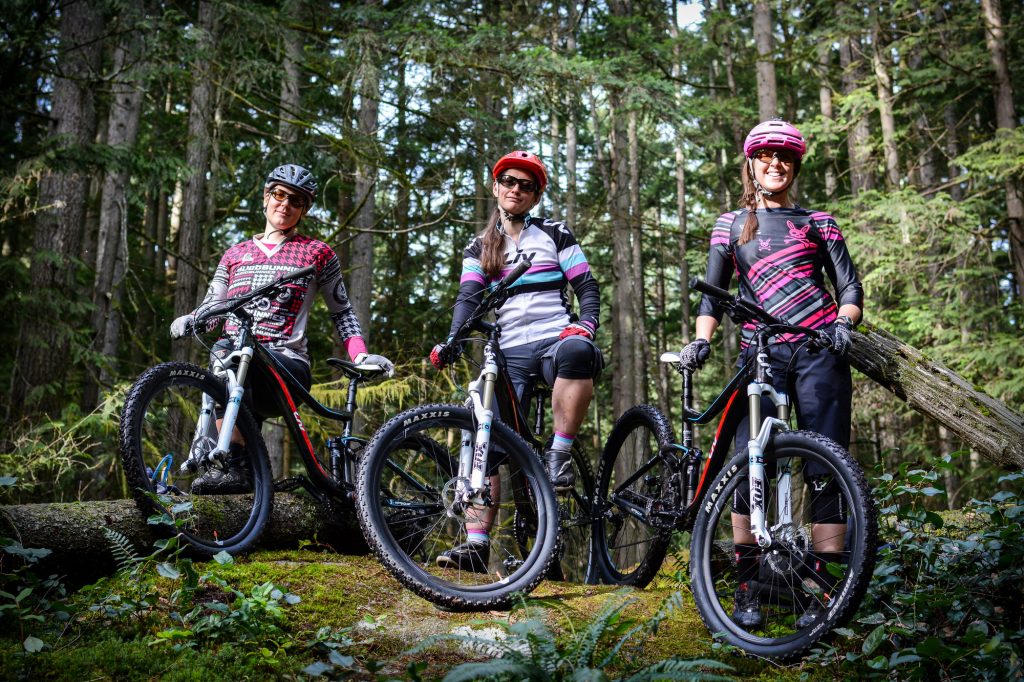
Market research indicates that women are the fastest growing segment of the population in terms of getting into cycling, and growing retail sales. One such survey by Liz Cornish (8)of the League of American Cyclists sought to understand women’s cycling experience, and ways to encourage them. Sadly, interviews with multiple shops across the USA found that many women do have unwelcoming first experiences at bike shops, which can be a major barrier for their entry into the sport. Cornish’s report indicates that one of the most important courses of action that the LBS should undertake is to make the experience a welcoming one; to make people of all backgrounds feel comfortable and that cycling is indeed for them.Having a go-to shop as a place to gain knowledge, access products, and feel welcomed into a community is a foundational need if women are to remain part of the sport.
For years, this has already been my typical ethos while at work and thus obviously somethingI would like to maintain.I treat everyone with respect and always welcome people as they enter the shop –I even designed the shop layout so my workbench is facing the door, so that as customers enter I can see them and greet them. Learning customer’s names, welcoming them, and thanking them for coming in has been part of my workplace etiquette for years, but it has become even more important now that I have become the face of the workshop.We don’t have a large focus on retail at our shop –rather we are focused on repair, rentals and instructional services.So when coming in for a repair, I take the time to assess customer’s bikes with them–to inform and empower them with knowledge and understanding of their bikes.
There is a lot of lingo and jargon when it comes to the bike that can sometimes feel like a foreign language to those without experience. One thing I learned from Jaclyn’s experience as a women in cycling was ways to make bike-speak less intimidating -especially if the customer is new to the sport. Cornish (9)also mentioned this as a way to create a welcoming space for women. When engaging with a customer and assessing a bike, rather than taking the approach of directly asking, for example,“do you know what the crankset is?” it is helpful to direct the customer’s attention visually to the parts of the bike as I describe them. It may be that the customer doesn’t know names of parts, but may have felt intimidated to say so. By pointing to the parts as I mention issues I find it allows customers to see directly what I am talking about, even if they may not have known the nomenclature. All these small details of intension will add up to a positive customer experience, which will in turn keep customers returning in the long-term.
Another very important factor that relates to community building and running the shop of my dreams is to treat staff well; to treat staff with the dignity and respect that they deserve. Sadly, while I believe this may seem like an elementary pillar of a successful business, so often it is not the case. I have certainly had my fair share of bad-bosses over the years, and hope to avoid many of their pitfalls.One of the lessons learnedI have learned while studying Workplace Psychology at university is that of organizational justice and how it relates to creating a workplace that is motivating, and engaging and fair for all people involved. This has been shown to increase employee retention and to foster feelings of community amongst staff members.According to Colquitt (386)the four principles of organization are Procedural Justice –the perceived fairness of procedural decisions; Distributive Justice -the consistent adherence to norms for allocation;Interpersonal Justice –treating others kindly and fairly; Informational Justice –the equal sharing of information in the work environment.As we begin bringing staff on board for the coming summer season, I have spent time reflecting on these ideas of Organizational Justice and how they can be implemented in a workshop environment.
Perceptions of Procedural Justice are strongly influenced by consistency and adherence to processes, and can be fostered by providing training and instruction. Part of motivating others to adhere to my high standards of service will be sharing knowledge while clearly explaining my methods and my expectations. DistributiveJustice can be addressed in being mindful that no mechanic feels as though they are forced to do all the entry-level work while another gets only the high end service–including myself in the sharing of good and bad repairs will increase motivation and enjoyment in the work shop. Interpersonal Justice is a factor that Jaclyn and I have taken to heart in our desire for creating a community environment by treating people with respect and sensitivity. In a work environment this will include listening to people’s ideas and involving them in the processes and decision making of the business. It also includes ideas such for flexible scheduling to suit employee needs. Informational Justice includes ideas as to how information is shared in the work environment, and is an area that I need to be particularly mindful of as I transition into being in charge. I have spent the last four-to-five years working very autonomously, and I know I have the capacity to thrive in such away, but that does not go very far in building a cohesive team, especially now that others will be looking towards me for direction. I will need to be mindful of providing thorough and candid explanations of my expectations, and be aware that communication styles may vary between people to make sure details are understood. When these pillars of organizational justice are implemented, there is a perception that the work place is fair.This should foster community amongst the staff which I believe will pay dividends in the long run –if staff know they are appreciated and respected they will give more back. I also believe that customers are not blind to workplace dynamics, and that if the staff is truly happy it will be noticed and add to welcoming feeling of the shop.
The bicycle industry has seen a unprecedented boon in sales and interest over the past two years and all indications point to this trend continuing, so I feel that building up this shop comes at the right time. However, Vancouver has many, many bike shops already, so Jaclyn and I really need a novel approach to stand out in the crowd. Our business model is focused primarily on selling our services –training, repair, instruction, rentals and so forth –rather than products. This is already a shift from the classic retail model of many shop, but I believe the biggest change is that we really are focused on making the shop a place, where everyone is welcome.
I had a conversation with a woman named Jennie last week when she came to pick up her bike. As I always do, I walked her slowly and thoroughly through the details of the serviceI had completed including what was working great, what I had already replaced and suggestions for future repairs.She paid her bill for my time, parts and knowledge.“You know,” she said to me “I just moved to the city and was looking for a new shop to call home. I came here because I started following this lady on instagram, who I think rides for you guys(unknowingly referring to Jaclyn) she’s quite the badass. The thing is, I so often go into shops and-although I grew up road riding and I know quite a lot about bikes-the guys behind the counter will just talk to my boyfriend, or assume I don’t know what they’re talking about. So thank you for just clearly walking through what you’ve just done with my bike, it looks great.” From there we began a conversation that covered many of the ideas discussed herein. Her first experience at our shop included a warm reception and a great repair, and she left happy. A few days later she called me back to book in a second bike for service. I believe that by continuing to build our relationship, she will be return many times to come.
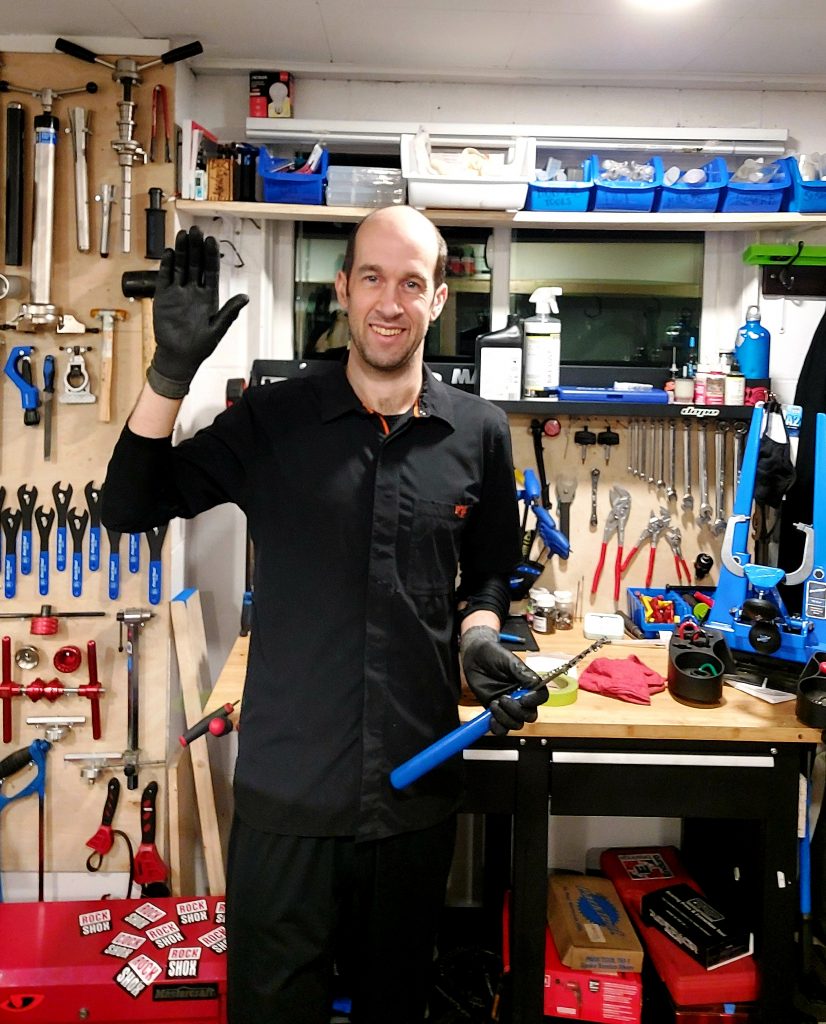
Photo by Geoff MacDonald.
I have heard it said before that as a cyclist, finding a trustworthy mechanic is a little bit like finding a hairdresser, in that if you are happy with their service, it is worth following them when they move shops. I have been running the workshop at Essential Cycles for six months now, and the feedback has been overwhelmingly supportive from the customers coming in. Although I have been forging new relationships daily, many of my customers thus far have been people with whom I’ve worked over the past eight years at my previous job. I’m extremely thankful that they have chosen to come with me on this journey. Building support that I am on the right track with my intensions at Essential Cycles, it has been rather surprising how many of them have explicitly complained about their experiences at my previous shop–many have mentioned how they don’t actually feel welcomed there, and are extremely happy that I now have my own workshop that they can consider their Third Place.
Works Cited
Colquitt, J. A. (2001). On the dimensionality of organizational justice: a construct validation of a measure. The Journal of Applied Psychology, 86(3), 386–400. https://doi-org.ezproxy.capilanou.ca/10.1037/0021-9010.86.3.386
Cornish, Liz. “Bike Shops for Everyone: Strategies for Making Bike Retail More Welcoming to Women.” League of American Cyclists. May 2015. https://www.bikeleague.org/sites/default/files/Bike_Shops_For_Everyone.pdf. Accessed 27 Feb 2022.
“History of the Muddbunnies.” Muddbunnies. http://www.muddbunnies.com/history.html. Accessed 5 April 2022
“Our Story.” Our Community Bikes. https://ourcommunitybikes.org/story/. Accessed 5 April 2022
Wesolowski, Timothy J., “The Great Good Bicycle Shop: Exploring the Community Roles of a Neighborhood Business” (2015). University Honors Theses. Paper 137.https://doi.org/10.15760/honors.126
“Who We Are.”Colour the Trails. https://colourthetrails.com/about/.Accessed 5 April 2022.
